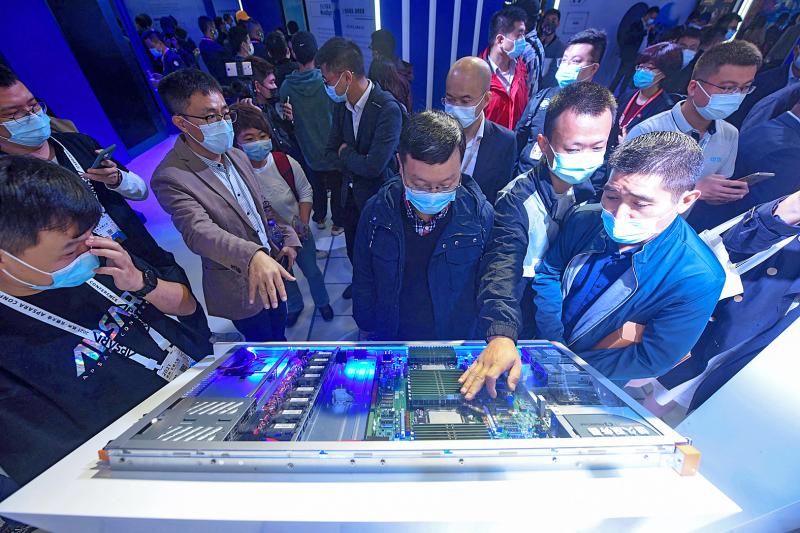Alibaba Group Holding Ltd (阿里巴巴) yesterday unveiled a new server chip that is based on advanced 5-nanometer technology, marking a milestone in China’s pursuit of semiconductor self-sufficiency.
The Chinese tech giant’s newest chip is based on micro-architecture provided by the SoftBank Group Corp-owned Arm Ltd, it said.
Alibaba, which is holding its annual cloud summit in Hangzhou, China, said that the chip is to be used in its own data centers in the “near future” and would not, for the time being, be sold commercially.

Photo: AFP
“Customizing our own server chips is consistent with our ongoing efforts toward boosting our computing capabilities with better performance and improved energy efficiency,” Alibaba Cloud Intelligence president Jeff Zhang (張劍鋒) said. “We plan to use the chips to support current and future businesses across the Alibaba Group ecosystem.”
Alibaba’s server chip is one of the most advanced yet by a Chinese firm, as it joins global rivals such as Amazon.com Inc and Google in gradually replacing silicon from traditional chipmakers like Intel Corp and Advanced Micro Devices Inc with products custom-designed for their data centers and workloads.
Alibaba is one of a number of Chinese firms that has answered Beijing’s call to invest in the development of cutting-edge technologies and manufacturing capacities.
The Arm-based server chip, known as the Yitian 710, is the third semiconductor introduced by the e-commerce giant since 2019, following an artificial intelligence chip and an Internet-of-Things chip.
However, with limited domestic semiconductor manufacturing capabilities, Alibaba would likely still need to outsource production. While the company did not disclose its manufacturing partner, Taiwan Semiconductor Manufacturing Co (台積電) and Samsung Electronics Co are the only two firms capable of mass-producing 5-nanometer chips.

South Korea’s equity benchmark yesterday crossed a new milestone just a month after surpassing the once-unthinkable 5,000 mark as surging global memory demand powers the country’s biggest chipmakers. The KOSPI advanced as much as 2.6 percent to a record 6,123, with Samsung Electronics Co and SK Hynix Inc each gaining more than 2 percent. With the benchmark now up 45 percent this year, South Korea’s stock market capitalization has also moved past France’s, following last month’s overtaking of Germany’s. Long overlooked by foreign funds, despite being undervalued, South Korean stocks have now emerged as clear winners in the global market. The so-called “artificial intelligence

NEW IDENTITY: Known for its software, India has expanded into hardware, with its semiconductor industry growing from US$38bn in 2023 to US$45bn to US$50bn India on Saturday inaugurated its first semiconductor assembly and test facility, a milestone in the government’s push to reduce dependence on foreign chipmakers and stake a claim in a sector dominated by China. Indian Prime Minister Narendra Modi opened US firm Micron Technology Inc’s semiconductor assembly, test and packaging unit in his home state of Gujarat, hailing the “dawn of a new era” for India’s technology ambitions. “When young Indians look back in the future, they will see this decade as the turning point in our tech future,” Modi told the event, which was broadcast on his YouTube channel. The plant would convert

‘SEISMIC SHIFT’: The researcher forecast there would be about 1.1 billion mobile shipments this year, down from 1.26 billion the prior year and erasing years of gains The global smartphone market is expected to contract 12.9 percent this year due to the unprecedented memorychip shortage, marking “a crisis like no other,” researcher International Data Corp (IDC) said. The new forecast, a dramatic revision down from earlier estimates, gives the latest accounting of the ongoing memory crunch that is affecting every corner of the electronics industry. The demand for advanced memory to power artificial intelligence (AI) tasks has drained global supply until well into next year and jeopardizes the business model of many smartphone makers. IDC forecast about 1.1 billion mobile shipments this year, down from 1.26 billion the prior

People stand in a Pokemon store in Tokyo on Thursday. One of the world highest-grossing franchises is celebrated its 30th anniversary yesterday.